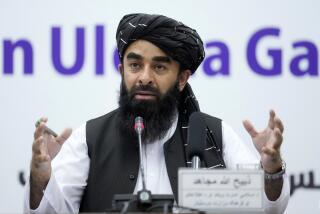Partly Healed but Still Ill
- Share via
When Hamid Karzai traveled to West Germany last year at this time for the international conference that designated him the interim president of Afghanistan, U.S.-led forces were searching caves in Tora Bora, warplanes were bombing targets across Afghanistan and Taliban leader Mullah Mohammed Omar was negotiating the surrender of the city of Kandahar before making good his escape.
Karzai returned to Bonn this week with much of his nation at relative peace, the Taliban government gone, women back in school and the capital, Kabul, featuring traffic jams of trucks and cars, not tanks. All of these good signs, however, do not add up to a functioning nation.
Warlords battled this week in western Afghanistan, where one of the chieftains collects millions of dollars a month from customs duties that should be going to the central government in Kabul. Controlling the warlords requires an army. Building an army takes money, lots of it. Until the army is built, someone else has to keep the peace.
Congress last month authorized aid of $425 million a year for the next four years for Afghanistan, plus a $1-billion fund to support the international peacekeeping force now in Kabul. Congress needs to begin appropriating the money; the Bush administration should establish a special Afghanistan-only account and stop the executive branch’s green-eyeshade folks from cutting it.
The United States has sent nearly $600 million in humanitarian assistance and reconstruction aid to Afghanistan during the last year. Other nations gave hundreds of millions more. But far more is needed.
A U.S. estimate of the cost to train, equip and sustain the Afghan army being assembled is $350 million a year for two years. The U.S. Agency for International Development’s ambitious plan to build schools and hospitals, dig drainage ditches, restore irrigation facilities and pour tar for roads to get crops to market will cost hundreds of millions more.
The Treasury Department agreed last month to dispatch U.S. customs officials to Afghanistan to help improve collection of customs duties at the border, which will also help Karzai’s anemic government.
The United States has no troops in the 4,800-member international peacekeeping force in Afghanistan but has supplied financial and logistical support. Washington needs to persuade nations such as Britain and Germany, which provide many of the troops, to put them in cities like Kandahar and Jalalabad. That would let the Karzai government expand its writ beyond Kabul. Afghanistan also will benefit from the planned increase in the number of U.S. troops doing reconstruction work.
Depriving the warlords of financing, territory and troops would give the central government more influence and, at least as important, more money. That is the only way to permanently reduce the burden on aid-giving nations without risking the return of chaos to Afghanistan.
More to Read
Sign up for Essential California
The most important California stories and recommendations in your inbox every morning.
You may occasionally receive promotional content from the Los Angeles Times.













